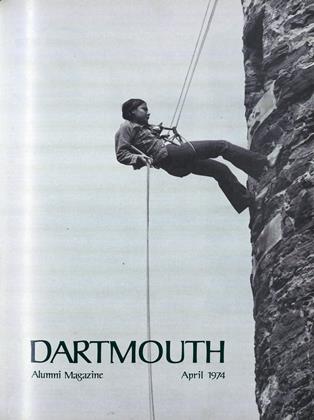With the initial volume of the Daniel Webster Papers, the first of a probable 14 or 15, already at the press and due to be published in the fall by the University Press of New England, new discoveries are still being made, Editor Charles M. Wiltse reports.
"The ever present dread of the historical editor," he notes, "is that some significant but hitherto unknown manuscript will turn up after he has gone to press. The collecting process is endless, and without rules or guidelines. After the holdings of libraehistorical societies, archives, and other public depositories have been searched chance takes over."
As a case in point, Wiltse tells about coming across, not long ago, a dealer's catalogue, several years old and certainly obsolete, that listed a collection of papers of the Haskins family, Boston merchants and contemporaries of Daniel Webster. The price listed was $135 for a collection of some 1,500 items, considerably less than the more than $250 a single Webster letter can currently draw.
"A phone call to the dealer in Connecticut brought the welcome word that the papers had not been sold and that the price remained unchanged," the editor reports. At his request, the College Library bought the collection. It turned out to include drafts of four letters to Webster relating to a lawsuit in which he represented the Haskins family, as well as correspondence with many other notable figures. Wiltse was relieved, he says, that "none of these documents falls in the time span of the volume of Webster correspondence no v in press."
After the items of particular Webster in- terest have been processed, the collection will be available to scholars in the Archives section of the Dartmouth library.
The staff of the Webster project had already searched an extensive collection of catalogues held by Yale University. Of the Webster items they found in catalogues dating back to the turn of the century, about a third had found their way into public collections and had been filmed for the project. Others were located in private collections. Perhaps half of these old listings are still unlocated.
"We always examine dealerscatalogues, no matter how old they maybe," Wiltse explains. "They often tell us of the existence of certain Webster letterseven though the letters themselves havechanged hands and are no longer available.This knowledge in itself may be valuable toan editor, in pin-pointing an exchange of correspondence, for example; and it hasoccasionally led to our locating the letteritself."
A similar, even more valuable, collection was recently acquired by the New Hampshire Historical Society, whose president, Dudley W. Orr '29, played an active role in the acquisition. These are the James Wilson papers, which had bee stored for almost a century in the basement of the Cheshire County Court House at Keene, N.H. The collection, which contains a number of Webster letters, was discovered when the Court House files were being searched for records of legal cases in which Webster appeared as counsel.
Wiltse reckons that detective work over five or six years has uncovered several hundred Webster items hitherto unknown or believed lost. Sometimes the rewards are quite unexpected, as indicated in the article on page 14.
 View Full Issue
View Full Issue
More From This Issue
-
 Feature
FeatureTomorrow: A Call for Limited Growth
April 1974 By DENNIS L. MEADOWS -
 Feature
FeatureUnquestionably the ugliest Building in Hanover"
April 1974 By JOHN R. SCOTFORD, JR -
 Feature
FeatureReels, Jigs, and Hornpipes
April 1974 By THOMAS W. SHERRY -
 Feature
FeatureYesterday: A Policy of Consumption
April 1974 By GORDON J. F. MacDONALD -
 Feature
FeatureToday: Views of an Embattled Oilman
April 1974 By WILLIAM K.TELL JR. -
 Feature
FeaturePoseurs, Impostors, and Scalawags
April 1974 By MARY BISHOP ROSS








